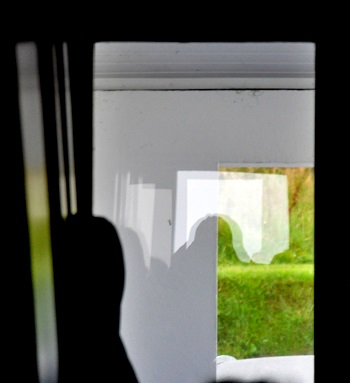 We traveled cross-country by car every year. From New York to Utah, from Utah back to upstate New York. Every summer, the drive took days, endless scorching hot summer days. Our mother made sandwiches before we left and put them in an icebox underneath our feet. She placed a large round thermos with lemonade in the back of the station wagon, wedged between suitcases, next to a paper bag filled with paper cups and paper plates.
We traveled cross-country by car every year. From New York to Utah, from Utah back to upstate New York. Every summer, the drive took days, endless scorching hot summer days. Our mother made sandwiches before we left and put them in an icebox underneath our feet. She placed a large round thermos with lemonade in the back of the station wagon, wedged between suitcases, next to a paper bag filled with paper cups and paper plates.
At gas stations our father wiped a thousand flattened bugs from the windshield. Our mother rubbed ice on the back of her neck. “Maybe we’ll stop early tonight, stay in a motel with a pool. Would you kids like that?” she said.
“Yes,” we said, all four of us—three girls and one boy—as we marched in place to stretch our legs, as we slid the dime into the silver slot to open the door of the gas station restroom, the stench of others’ bodies barreling out. We helped ourselves to the lemonade in the back of the station wagon, holding the waxy cup underneath the hopeful spigot, waiting—we were always waiting then—for our small cups to fill up.
I was the youngest in our family, the one who, when we left New York for good, when we moved to Utah to be closer to our parents’ parents, our extended family, would remember the least. The two-story red house. The willow tree in the backyard. Snowstorms in winter. I remember New York in fragments, tiny bits. Fireflies in summer. The stickers on the chest of drawers in the mud room: an elf pushing a wheelbarrow full of flowers; a cat dressed in a jaunty blue-and-white striped tie; a smiling chicken riding on top of a birthday cake. I remember the taste of shakes from Carroll’s after church, what we each liked: vanilla for my sisters, strawberry for my brother, chocolate for me. Every month a tin arrived by delivery, Charles Chips. Every winter we drove to the bowling alley in Fremont, which was next to a dairy and next door to the family who owned the dairy that had flooded the field next door to make a smooth pond. Here my brother and sisters laced up their skates, and I slid stiff-legged on small winter boots while they pulled me across the ice, my arms up like a wishbone.
In the summer, as we drove across country once again, I sat in the back seat, in the middle, cutting from scraps of material a green plaid dress, a new outfit for my paper doll. One sister leaned her head against the window and fell asleep. The other drew a picture of a mouse in blue crayon, eyes open, wildly alert.
Now our parents are ninety-two, failing fast. Our mother has fallen twice this past year. The most recent required hip surgery, a hospitalization, then two months at a rehabilitation center. She’s home now but uses a walker. She cannot lift her arms to brush her hair, has trouble reaching switches to turn lights on or off. Our father shuffles and moves slowly, using a cane. When you ask how he’s doing, he says, “I’m getting old.” To watch him walk from the TV room to the kitchen for a cup of milk means holding your breath.
What do I remember now of those long-ago cross-country trips? What I remember has little to do with leaving or arriving but what happened in between, how little happened. I remember the waiting. How in the car, we waited, as all children do, for the next thing to happen, for the car to stop. For change. For the future. For movement, then the cessation of movement. For the car to pull into the gas station. For that first pleasure of putting our feet on the ground. For the small cup to fill with lemonade. For that first sip. For something cold in the heat. The ache, then sweet relief. All of it unbearable to think of now.
__
Marilyn Abildskov is the author of The Men In My Country. Her work has appeared in Black Warrior Review, AGNI, Southern Review, and many other literary journals. She is the recipient of fellowships from the Rona Jaffe Writers’ Foundation, the Corporation of Yaddo, and the Djerassi Writing Residency. She lives in the San Francisco Bay Area and teaches in the MFA Program at Saint Mary’s College of California.
Photo by Dinty W. Moore

8 comments
J Doyle says:
Sep 18, 2017
Achingly beautiful.
A Aldous says:
Sep 22, 2017
Beautiful and so familiar.
Charlene Caruso says:
Oct 20, 2017
Such clear, precise childhood images opening us to the painful adult forms of waiting.
Claudia Monpere says:
Oct 22, 2017
Such a moving piece.
Stephanie says:
Nov 16, 2017
I really enjoyed this moving piece it made me think about my past as a little boy.
Maddie says:
Mar 29, 2018
I think that this was such a mature and interesting piece.
John Janelle Backman says:
Apr 24, 2024
OMG, Charles Chips! The first time they appeared in our house I thought we’d gotten manna from heaven. Thank you for this and the exquisite level of detail overall. I feel as though I’m right in the car with you.
Autumn Shah says:
May 1, 2024
I really enjoyed this; so nostalgic and bittersweet.